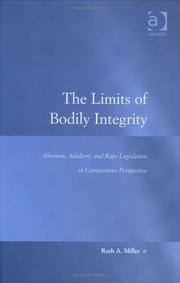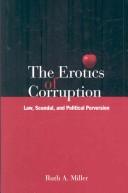| Listing 1 - 8 of 8 |
Sort by
|

ISBN: 9780754670612 0754670619 9781315556024 9781317025375 9781317025382 9781138271074 Year: 2007 Publisher: Aldershot, Hampshire, England ; Burlington, VT : Ashgate,
Abstract | Keywords | Export | Availability | Bookmark
 Loading...
Loading...Choose an application
- Reference Manager
- EndNote
- RefWorks (Direct export to RefWorks)
Miller's study argues that legislation on abortion, adultery, and rape has been central to the formation of the modern citizen. Case studies on the Ottoman Empire, Turkey, France, and Italy explore the international implications and address the role of sexuality and reproduction in constructing 'civilizational' relationships.
Sex and law. --- Women --- Civil rights. --- Human reproduction --- Sex and law --- Civil rights --- Sexualité et droit --- Femmes --- Droits de l'homme --- Reproduction humaine --- Legal status, laws, etc. --- Law and legislation --- Droit --- Law, Politics & Government --- Law, General & Comparative --- Legal status, laws, etc --- Government policy --- Government policy. --- Sexualité et droit --- Human females --- Wimmin --- Woman --- Womon --- Womyn --- Females --- Human beings --- Femininity --- Law and sex --- Sex crimes --- Human physiology --- Reproduction --- Reproductive health --- Reproductive rights --- Basic rights --- Civil liberties --- Constitutional rights --- Fundamental rights --- Rights, Civil --- Constitutional law --- Human rights --- Political persecution --- Sex --- Women Legal status, laws, etc.
Book
ISBN: 9780190638399 0190638397 Year: 2017 Publisher: New York, NY : Oxford University Press,
Abstract | Keywords | Export | Availability | Bookmark
 Loading...
Loading...Choose an application
- Reference Manager
- EndNote
- RefWorks (Direct export to RefWorks)
In recent decades there has been an explosion in work in the social and physical sciences describing the similarities between human and nonhuman as well as human and non-animal thinking. In this work, Ruth Miller argues that these types of phenomena are also useful models for thinking about the growth, reproduction, and spread of political thought and democratic processes. By shifting her level of analysis from the politics of self-determining subjects to the realm of material environments and information systems, Miller asks what might happen if these alternative, nonhuman thought processes become the normative thought processes of democratic engagement.
Bioethics. --- Biology --- Reproduction --- Reproductive rights. --- Sociobiology. --- Political aspects. --- Social aspects. --- Biologism --- Human biology --- Human evolution --- Psychology, Comparative --- Social evolution --- Reproductive freedom --- Sexual rights --- Abortion --- Birth control --- Contraception --- Human reproduction --- Involuntary sterilization --- Amphimixis --- Generation --- Pangenesis --- Procreation --- Life (Biology) --- Physiology --- Sex (Biology) --- Embryology --- Generative organs --- Theriogenology --- Bioethics --- Life sciences --- Biomass --- Natural history --- Biomedical ethics --- Life sciences ethics --- Science --- Social aspects --- Moral and ethical aspects

ISBN: 0791478203 143565854X 9781435658547 9780791474532 9780791478202 0791474534 9780791474549 0791474542 Year: 2008 Publisher: Albany, N.Y. State University of New York Press
Abstract | Keywords | Export | Availability | Bookmark
 Loading...
Loading...Choose an application
- Reference Manager
- EndNote
- RefWorks (Direct export to RefWorks)
In this provocative retelling of the story of political corruption in the modern period, Ruth A. Miller argues that narratives of political corruption rely upon an explicitly pornographic rhetoric and have been instrumental in carving out lawless or exceptional space. Drawing upon an extensive and wide-ranging literature, she examines corruption, the erotic, and legal exceptionalism as they appear in media representations of Saddam Hussein as "corrupt leader," nineteenth-century political cartoons, Pier Pasolini's film Salo, Ernst Kantorowicz's theorization of the body politic, Giorgio Agamben's analysis of biopolitics, and Achille Mbembe's discussion of the postcolony. Miller comments on both the erotic nature of the state of exception and colonial or postcolonial manifestations of it, and presents a new voice in ongoing conversations about law, violence, and sexuality in the contemporary world.
Political corruption. --- Sexual ethics. --- Sex --- Sex ethics --- Sexual behavior, Ethics of --- Ethics --- Boss rule --- Corruption (in politics) --- Graft in politics --- Malversation --- Political scandals --- Politics, Practical --- Corruption --- Misconduct in office --- Moral and ethical aspects --- Corrupt practices
Book
ISBN: 0804772428 9780804772426 0804762562 9780804762564 Year: 2009 Publisher: Stanford, Calif. Stanford University Press
Abstract | Keywords | Export | Availability | Bookmark
 Loading...
Loading...Choose an application
- Reference Manager
- EndNote
- RefWorks (Direct export to RefWorks)
Taking natural disaster as the political and legal norm is uncommon. Taking a person who has become unstable and irrational during a disaster as the starting point for legal analysis is equally uncommon. Nonetheless, in Law in Crisis Ruth Miller makes the unsettling case that the law demands an ecstatic subject and that natural disaster is the endpoint to law. Developing an idiosyncratic but compelling new theory of legal and political existence, Miller challenges existing arguments that, whether valedictory or critical, have posited the rational, bounded self as the normative subject of law. By bringing a distinctive, accessible reading of contemporary political philosophy to bear on source material in several European and Middle Eastern languages, Miller constructs a cogent analysis of natural disaster and its role in modern subject formation. In the process, she opens up exciting new lines of inquiry in the fields of law, politics, and gender studies. Law in Crisis represents a promising new development in the interdisciplinary study of law.
Law --- Subjectivity. --- Natural disasters --- Law and politics --- Subjectivism --- Knowledge, Theory of --- Relativity --- Jurisprudence --- Philosophy. --- Law and legislation. --- Political aspects.
Book
ISBN: 9780190638368 Year: 2017 Publisher: Oxford Oxford University Press
Abstract | Keywords | Export | Availability | Bookmark
 Loading...
Loading...Choose an application
- Reference Manager
- EndNote
- RefWorks (Direct export to RefWorks)
Book
ISBN: 0472029509 9780472029501 9780472119004 0472119001 Year: 2013 Publisher: Ann Arbor [Michigan]
Abstract | Keywords | Export | Availability | Bookmark
 Loading...
Loading...Choose an application
- Reference Manager
- EndNote
- RefWorks (Direct export to RefWorks)
It is possible to imagine a theory of democracy and a constitutional history independent of human subjectivity.
Democracy --- Communication and traffic --- Transportation, Automotive --- Constitutional law. --- Constitutional history. --- Philosophy. --- Political aspects.
Book
ISBN: 1283340860 9786613340863 0472027786 9780472027781 0472117963 9780472117963 9781283340861 6613340863 Year: 2011 Publisher: Ann Arbor University of Michigan Press
Abstract | Keywords | Export | Availability | Bookmark
 Loading...
Loading...Choose an application
- Reference Manager
- EndNote
- RefWorks (Direct export to RefWorks)
Treating language as a type of machine code opens new avenues for the study of history and politics.
Women --- Speeches, addresses, etc., American --- Suffragists --- English language --- Suffrage --- History --- History and criticism. --- Language. --- Political aspects
Book
ISBN: 0472122304 0472130102 9780472122301 Year: 2016 Publisher: Ann Arbor : University of Michigan Press,
Abstract | Keywords | Export | Availability | Bookmark
 Loading...
Loading...Choose an application
- Reference Manager
- EndNote
- RefWorks (Direct export to RefWorks)
"Challenging the posthumanist canon which celebrates the pre-eminence of matter, Ruth Miller, inFlourishingThoughtargues that what nonhuman systems contribute to democracy is thought. Drawing on recent feminist theories of nonhuman life and politics, Miller shows that reproduction and flourishing are not antithetical to contemplation and sensitivity. After demonstrating processes of life and processes of thought are indistinguishable, Miller finds that four menacing accumulations of matter and information--global surveillance, stored embryos, human clones, and reproductive trash--are politically productive rather than threats to democratic politics. As a consequence, she questions the usefulness of individual rights such as privacy and dignity, contests the value of the rational metaphysics underlying human-centered political participation, and re-evaluates the gender relations that derive from this type of participation. Ultimately, in place of these human-centered structures, Miller posits a more meditative mode of democratic engagement. Miller's argument has shattering implications for the debates over the proper use and disposal of embryonic tissue, alarms about data gathering by the state and corporations, and other major ethical, social, and security issues"--
Democracy --- Feminist theory. --- Philosophy. --- Social aspects. --- Moral and ethical aspects. --- Feminism --- Feminist philosophy --- Feminist sociology --- Theory of feminism --- Self-government --- Political science --- Equality --- Representative government and representation --- Republics --- Philosophy --- SOCIAL SCIENCE / Gender Studies. --- POLITICAL SCIENCE / History & Theory.
| Listing 1 - 8 of 8 |
Sort by
|

 Search
Search Feedback
Feedback About UniCat
About UniCat  Help
Help News
News